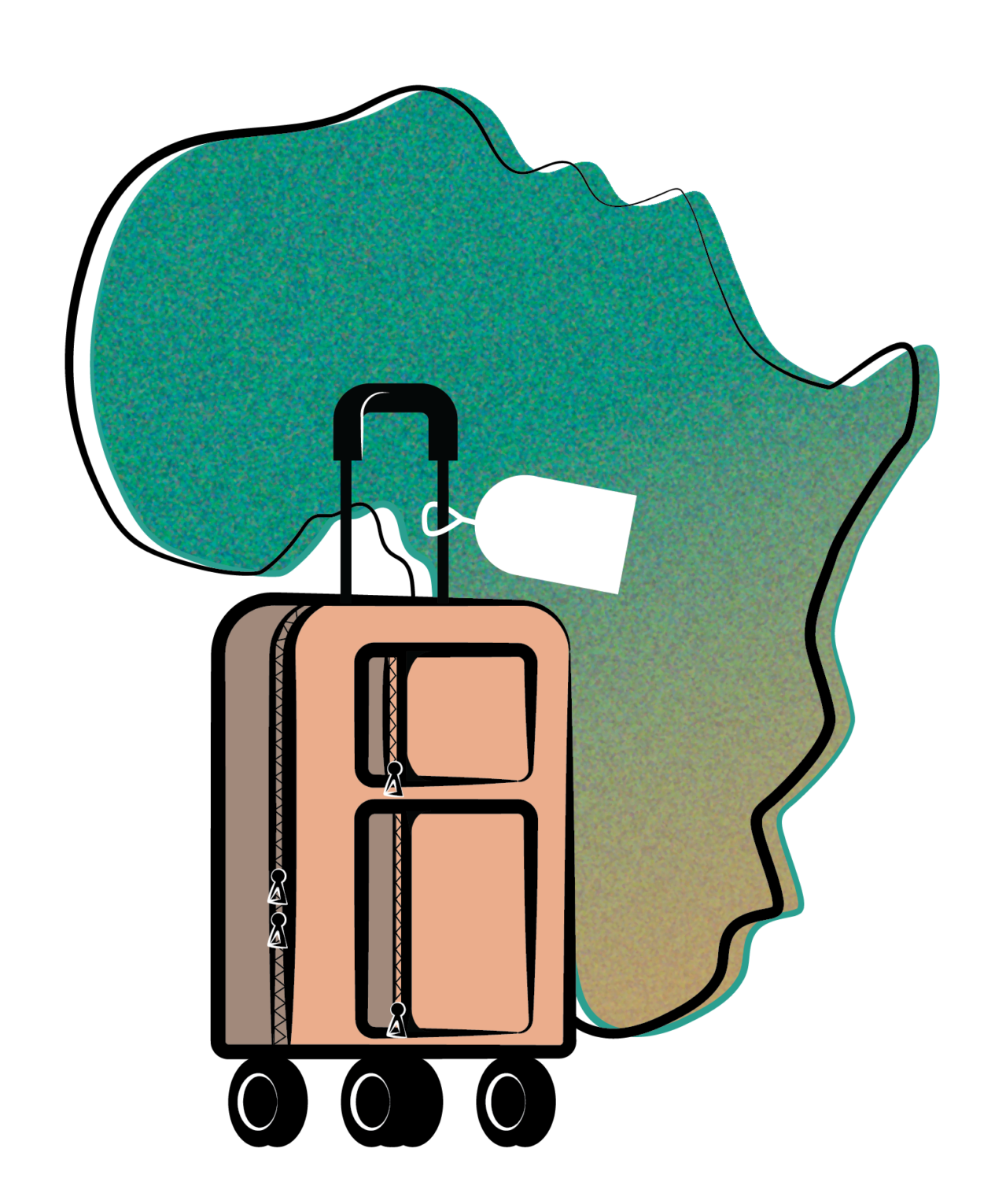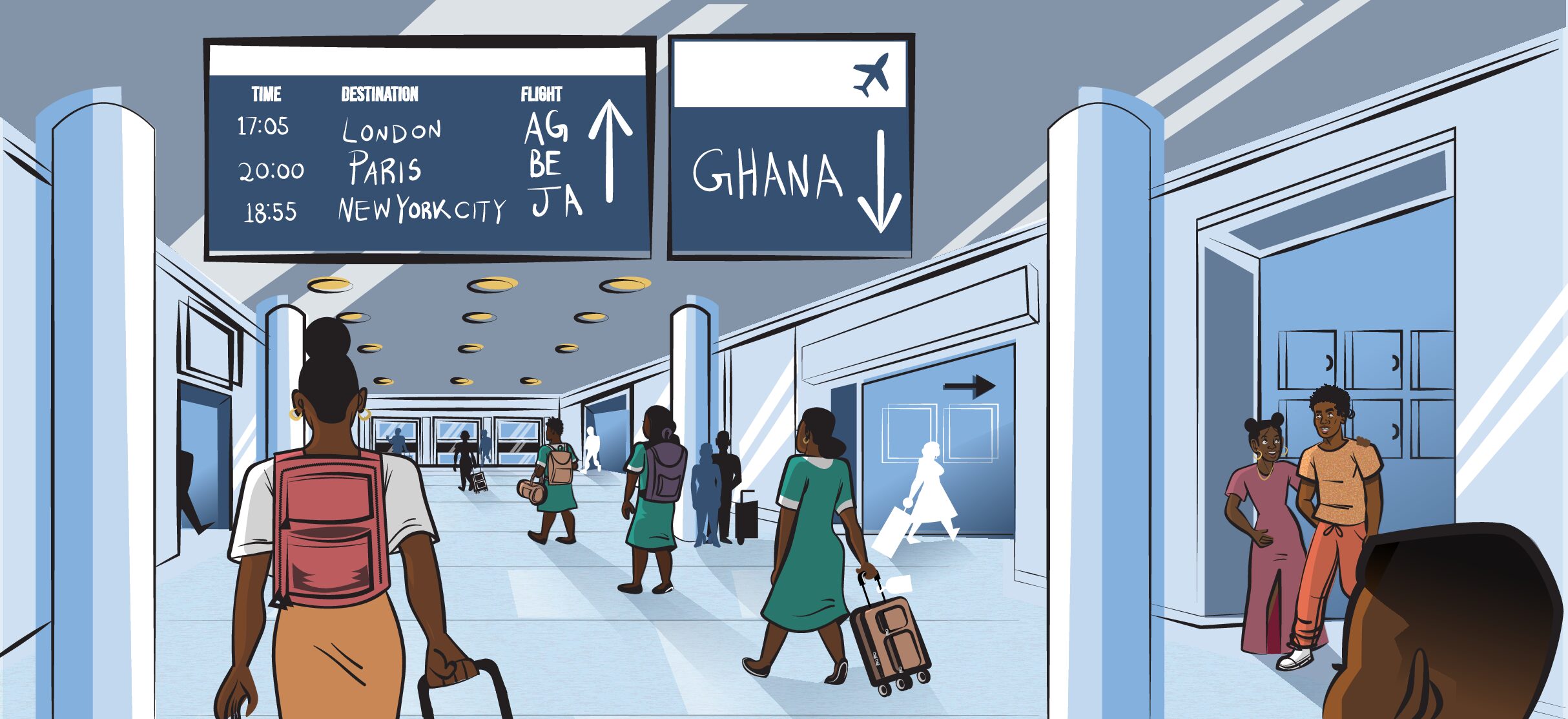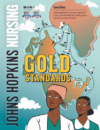To protect a treasured resource—nurses and midwives—Yvonne Commodore-Mensah, Matilda Decker, and their team educate stakeholders and empower workers.
Ghana is once again sitting on a gold mine.
Known for centuries as part of the African continent’s Gold Coast for its rich stores of the precious metal, the nation was often exploited by global outsiders for their own gain. The treasure this time is nurses and midwives—too many to fully train and fruitfully employ in an overburdened yet underdeveloped health care system. A desperate world calls for their service; they need work to support families as well as to satisfy their yearning for professional growth. Feeling stuck, they have gone abroad in droves.
The world’s gain has been Ghana’s loss, in brain power and population health.
But that dynamic could soon change. Ghanaians including Johns Hopkins School of Nursing (JHSON) faculty members Yvonne Commodore-Mensah, PhD, MHS, RN, FAAN, and Matilda Decker, DNP, APRN, alumnus Ruth-Alma Turkson-Ocran, PhD ’19, MPH, RN, and DNP student Jacqueline Idun, MSN, are working health care policy, education, and communication channels in their birth country to help safeguard the freedom for nurses to choose their own path, including ways to stay—or return—home.
One key is to empower Ghanaian leaders through smart, sustainable policy and persuasion to
develop and share the wealth in a manner that serves all parties, the West African nation’s own populace included.
Another, more important than simply adjusting the financial math (though that is of course crucial), is changing the entire narrative. The current story: Ghana does not invest adequately in its nurses and midwives. These essential health workers feel unseen, struggle to find jobs, or end up in positions where a lack of pay, equipment, training, and staff make success and satisfaction unreachable. They burn out, or they head out. Ghana does not recognize how their plight—and their flight—has held the nation back.
“Ghanaian nurses are not asking for much. Fair wages and a safe environment,” often simply meaning personal protective equipment.
“Despite boasting over 120,000 nurses, Ghana has only 3.6 [working] nurses per 1,000 people,” according to Ethically Managing the Migration and Recruitment of Nurses in Ghana: Roundtable Report 2023, organized by the Ghanaian-Diaspora Nursing Alliance (G-DNA) with support from the Johns Hopkins School of Nursing and its Institute for Policy Solutions and CGFNS International. “This disparity is exacerbated by the exodus of Ghanaian nurses, with an estimated 7,000 departing since 2022 alone.”
The new narrative: “There is an opportunity for Ghana to strategically position itself as a center of excellence in the training of nurses and midwives,” says the report. “This will require the implementation of evidence-based strategies on recruitment and retention of nurses and midwives.”
“We think that this could be a win-win for Ghana and countries that are experiencing the nursing shortage,” explains Commodore-Mensah, a researcher and Rising Professor at JHSON who is also president and cofounder (with Decker) of G-DNA. “However, it requires deliberate investment in the training of nurses. For instance, the skills labs in Ghana are in dire need of equipment and simulation devices. There are not enough faculty members to teach in the advanced nursing practice areas. They need support in standardizing and enhancing advanced practice education in Ghana.”
High-income countries such as the United States, Britain, and Canada have lost a great many of their own nurses, with retirements, nurse burnout, COVID fallout, and—in the West as well—a lack of adequate faculty to train new cohorts having only widened a workforce gap. These and other factors, including nurse-value blind spots not always so different from Ghana’s, have led health systems to look elsewhere for essential workers.
Fair Is Fair
From the outside, West Africa looks like a good place to start.
“Ghanaian nurses are not asking for much,” says Commodore-Mensah. “Fair wages and a safe environment,” often simply meaning a supply of gloves and other personal protective equipment. Others are ready to work but there are no jobs, with an estimated 90,000 unemployed nurses.
A frustrated or even frightened nursing workforce is fertile ground for recruiters.

And since the government pays to educate nurses—and serves as Ghana’s largest employer of graduates—raising their stature and value in the eyes of the nation’s policy makers is essential to shaking loose the investment to improve safety, training, and opportunity. “You must engage the right leaders,” says Commodore-Mensah. “We need to show them, ‘This is what you have to lose.’ ”
As for wealthier nations, she adds, they must agree to give as well as take: “You are reaping what you haven’t sown.”
G-DNA is not alone, or first, in this fight. So also crucial is granting assistance, without preconceptions, to those stakeholders already on the ground. Decker and Commodore-Mensah say the G-DNA is listening to and learning from “a who’s who,” including the Ghana Health Service, Nursing and Midwifery Council of Ghana, Ghana Registered Nurses and Midwives Association, the World Health Organization, JHSON’s Center for Global Initiatives, and of course the Ghanaian Ministry of Health, among other groups, smartly adding key leaders to the G-DNA executive team. It will take all hands.
“There is so much work to be done, so much time and effort,” says Decker.
Establishing Trust
Decker explains her own and Commodore Mensah’s passion for the task in simple terms: “Our families
live in Ghana.”
“So may we, eventually,” Commodore-Mensah adds, explaining that frequent family visits as well as the work with G-DNA mean the pair are physically in Ghana on a regular basis.
Besides, Decker says, success for G-DNA means “our own people supporting our own people. It’s beautiful.”
Though both left Ghana and are professional nurses in the U.S. (as well as JHSON alumni), neither Decker nor Commodore-Mensah is part of the diaspora. Decker moved to the United States at age 11 to live with her father; Commodore-Mensah came for college, but with no dreams of nursing. She’d seen in Ghana how the profession was perceived. (It was a Johnson & Johnson nurse recruitment poster—“Join the Ones Who Dare to Care”—that touched her heart and changed everything.)
This makes both women, with their Western education and careers, “outsiders” to nurses in Ghana. Commodore-Mensah mimics a Ghanaian nurse: “You don’t get it!”
And they get THAT, Commodore-Mensah explains: “We come in humility. We’re not just people who talk. We have data. We’re going to help lay the foundation, and we’re going to walk through this with you.”
Trust takes time and positive experience. G-DNA has been in existence for just under two years, yet has already come an exceptionally long way from the day it was conceived. As Decker and Commodore-Mensah tell it, during a fire drill at JHSON, they got to talking about their shared Ghanaian ancestry, the diaspora of nurses, and the need to do something to help. The drill ended. The idea for G-DNA had caught fire.
“We are not here to encourage nurses to migrate. But it is their right to work wherever they choose, and we support that. People are going to migrate. Now, how is it done in an ethical manner?”
Today, G-DNA has almost 2,000 members (there are no dues, and more members are welcome), and the organization hosts regular webinars and skills training sessions in Ghana and elsewhere, again keeping costs low by begging or borrowing equipment and expertise to encourage attendance by nurses struggling to get by.
All of this is aimed at instilling confidence among nurses in their abilities so that they see their own value and can make informed choices, as well as provide better care. And a recent hands-on G-DNA workshop on perineal suturing made national news in Ghana, an invaluable word-spreader and big boost for nursing’s profile there. Decker calls the efforts a small price “to give back to your own people.”
“I have my own practice,” says Decker of Eden Healthcare Services, which caters to a largely military veteran population in Dover DE. “How do we get our [Ghanaian] nurses to attain full autonomy in practice?”
Lure of the Unknown
First, G-DNA and its allies must stem a rising tide.
According to Ethically Managing the Migration and Recruitment of Nurses in Ghana, in 2022, 67.9 percent of professional nurses intended to migrate, as did 54 percent of nurses in Zimbabwe. In a 2023 survey, 41 percent in Eswatini said they planned to seek employment overseas. Ghana’s planned migration figure for 2023 was 65.6 percent.
“We are not here to encourage nurses to migrate.
But it is their right to work wherever they choose,
and we support that,” explains Commodore-Mensah. “People are going to migrate. Now, how is it done in an ethical manner?”
Outside recruiters offer promises of better pay, equipment, and working conditions. But there’s no getting around the fact that these nurses leave home for something literally foreign—potential language barriers, societal differences, living arrangements. Are the nations bringing in Ghanaian nurses and midwives offering a genuinely safe harbor in which they can grow and flourish?
G-DNA is working to prepare travelers for what awaits them in wealthier spots and to develop a means of checking in to make sure what was promised is being delivered. And it is pushing global agreements that take countries off the recruitment list should they be stretched too thin on nursing and midwifery for their own health.

As for the workers facing a difficult choice for themselves and their families, Commodore-Mensah emphasizes the necessity of education, enabling these health workers to harness their skills with confidence—and know their worth—practicing in safety, wherever they are. G-DNA is there to make being a nurse easier in Ghana, and show more nurses that the grass can be greener right where they are. “These nurses are yearning for more,” says Commodore-Mensah.
Perhaps many will begin to realize that they needn’t leave Ghana to be great.
“G-DNA is here to advocate for nurses who find themselves in situations that are not ideal, to provide mentorship that means people are more often making the decisions to stay,” Decker explains.
Or, in the case of those who’ve chosen to migrate, to see that they can bring knowledge and experiences from other nations back home one day as mentors
and educators.
“This is the brain gain,” insists Commodore-Mensah.
Policy Win
“We don’t see any reason why, in 10 years, Ghana’s nursing can’t be the best in Africa,” says Decker, adding that what G-DNA and its allies accomplish could be a model for nations in Africa and beyond.
“We have the human resources, right?” adds Commodore-Mensah.
One huge policy victory came when the nation’s leaders agreed to roll back a requirement that G-DNA members hoping to practice in Ghana—even if fully licensed elsewhere—pass an examination and then volunteer for six months in order to prove their worth, a tough ask.
Now, the mandatory exam is out, and nurses must volunteer only two weeks, which Commodore-Mensah agrees is not a bad idea anyway, for both sides.
“We hope it will open the floodgates of people who want to come back and give back.”


